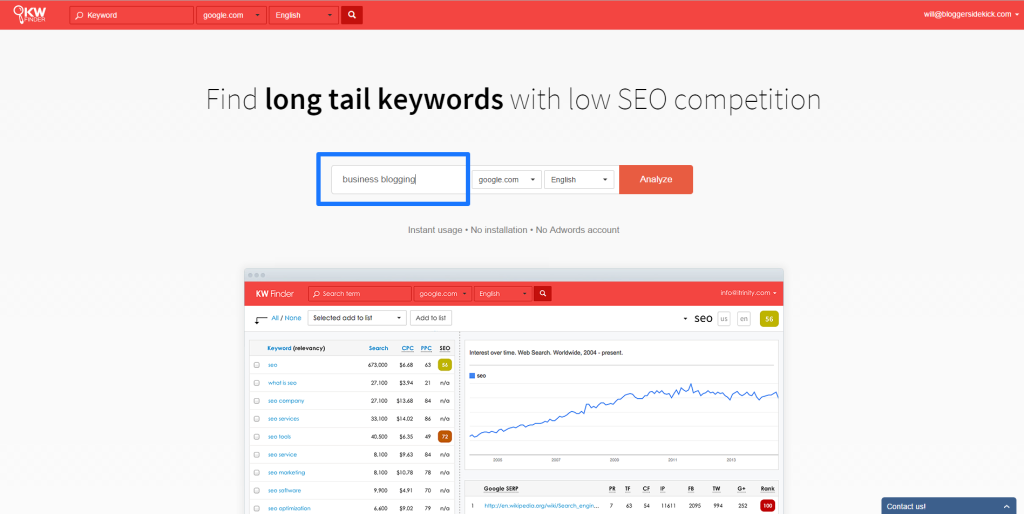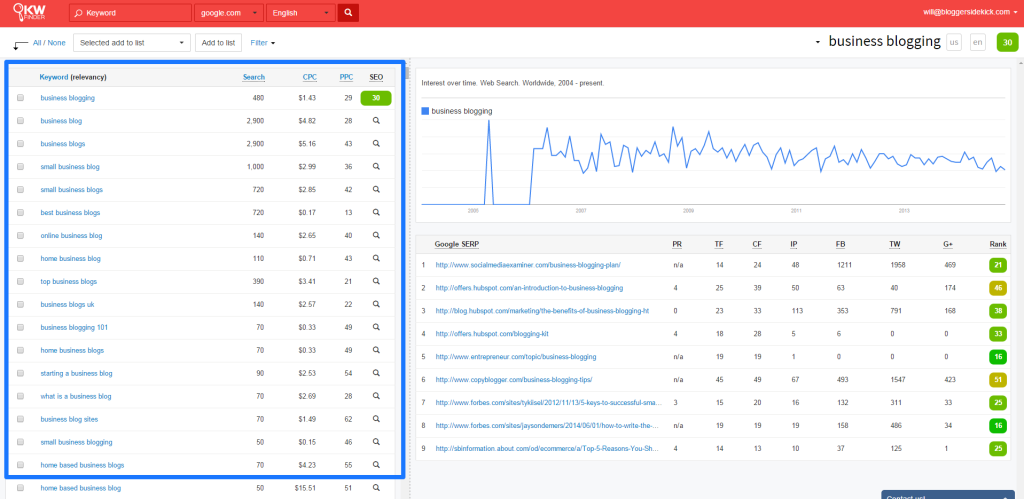Why Blogging is Critical to Your Business

Do you think blogging is still important to the success of your online business?
I certainly do. In fact, the irony of writing a blog post about the death of blogging always amuses me. Blogging is far from dead, it is still a crucial element in boosting the visibility of your website.
I decided to jot down a few points about why I think blogging is still important for businesses, and here is what I came up with (backed by some cool examples and interesting stats)
1. Search engines love your blog
Why do search engines love your blog?
Because blogs give them so many chances to figure out what your website, and each page on it is all about. By including ‘long-tail keywords’ in your blog content, you predict what your customers will type into search engines and improve your chance of appearing on the first page in a search query.
But how do you predict exactly what your customer is typing into a search engine?
A great tool I use to conduct long-tail keyword research is called KWFinder.com. Below you will see a screenshot of the home page for that site.

As an example I have typed in ‘business blogging’ to the search function, a phrase that is quite generic but should find me a whole lot of interesting long-tail keywords. In the next screenshot you will see the search results that KWFinder has generated for ‘business blogging’.

The results of my search in KWFinder show the search volume for each of the long-tail keywords that are similar to the term ‘business blogging’. Not only does this give you loads of great blog topic ideas, but it also shows you which long-tail keywords might be worthwhile to include in the body of your blog content. (Hint: Don’t target the phrases with the biggest search volumes you probably won’t be able to compete!)
Companies that blog are more likely to be found on page one of Google! [Click to Tweet]
If you’re a little unsure about how to conduct keyword research, here are a couple of helpful resources;
- How to Do Keyword Research – Moz
- The Advanced Guide to SEO (Keyword Research) – Quicksprout and Neil Patel
2. Social networks crave blog content
After search engines, social media delivers the most traffic to websites. If you write highly engaging content that people want to share on social media you will drive a significant spike in your website traffic. Have a look at the screenshot below of a post I wrote originally here at Bluewire Media and then syndicated at Business2Community. It has been shared over 2,000 times on social media! Imagine the traffic spike from that post alone.

Pure web traffic is not always a good thing unless you can convince those readers to do something more meaningful; be that a social share, comment, email sign-up or purchase. That is why it is essential to optimise your blog posts with call-to-actions.
Here is a nice post with ‘15 Call-To-Actions for Blog Posts‘ I found over at Writtent.
Also if you use WordPress, I recommend getting the calls-to-action plugin from ‘Inbound Now’ – it will help you convert more traffic into leads.
3. Helpful blog content drip feeds quality leads into your sales funnel
A sales rep is only contacted after a customer has independently completed 60% of the purchasing decision process. (Source) [Click to Tweet]
Your goal when running a business blog should be to provide helpful content to your customers at every stage of their sales journey. Whenever your potential customers have a question about your product or service, and they type that question into Google, wouldn’t it be great if you had written a blog post to answer it for them?
An example of this is to write a blog post that compares your product or service to a competitor. Your average customer who is researching a purchase decision will value this type of information, but be careful not to over-sell your side of the equation. Be objective and it will build trust with your customer.
Check out this post for how to create a product comparison; ‘The Ultimate Guide to Creating a Product Comparison’
Here is a 3rd party site called ‘Elegant Themes’ that did a comparison of WordPress and Tumblr, but this would be a great example of what you could do with your product.
Business Blogging Case Study
I urge you to read the Groove HQ blog if you get a chance, it is the perfect example of successful blog marketing. It proves the value of blogging for business growth and delivering quality leads into your sales funnel, check out this post to see what I mean;
The ROI of Blogging – Groove HQ
4. A successful blog saves you money on traditional marketing techniques.
Outbound marketing costs on average 2.7 times inbound marketing per lead. (Source) [Click to Tweet]
Outbound marketing techniques, such as pay-per-click advertising, assume that to get people’s attention you need to pay for it. Inbound marketing flips that assumption on its head. Instead of exchanging money for people’s attention you exchange valuable content that solves their challenges. This content requires an investment of time, not money.
Every time one of your customers reads or shares the content you provide, you place a trust deposit. The more deposits you place, the higher the trust, and the less work you need to do to convince those customers to buy your product or service. With paid advertising, once you stop paying, people stop listening. But with inbound marketing you build a castle of content that accrues value over time.
Helpful content creates trust. This trust then becomes the cornerstone for customer advocacy. [Click to Tweet]
Your blog is one of the easiest ways to provide helpful content to your customers.
5. High quality blog content helps you stand out from your competition as an expert.
“You can’t be a thought leader without being a writer” – Ann Handley
Creating a reputation for your brand that commands authority in its field requires a number of factors to be in alignment. Perhaps the most important of these factors is your ability to write high quality content backed by original ideas, research and practice. Your blog is the perfect channel for distributing this thought leadership content and increasing your credibility. In fact thought leadership is one of the top reasons companies choose to blog. (Source)
Here are 3 posts that you may find interesting when it comes to thought leadership;
- The power of writing with an ‘undiluted voice’ (interview with Ann Handley, author of Everybody Writes) – Trevor Young (PR Warrior)
- Three Steps to Becoming a Thought Leader in Your Industry – Louise Julig (Social Media Examiner)
- How Can B2B Brands Become Thought Leaders With Content Marketing? – Yael Kochman (Steam Feed)
My Verdict
Blogging isn’t dead, it is just getting harder. [Click to Tweet]
Your readers have an exorbitant amount of choice for what they read, and it is extremely easy to get lost in that noise. Therefore it’s never been more important to create fantastic blog content. If you consistently create high quality blog content you will;
- Develop a lasting relationship with page one of Google
- Maintain a full sales funnel
- Be a rock star on social networks (and get the added web traffic as a result)
- Save money on expensive outbound marketing campaigns
- Build authority in your industry
If you want to create high quality blog content every time, I recommend using a checklist. You may find some value in the Blog Post Checklist I created. You can download it as a PDF here, or perhaps you’d like to create one of your own.

